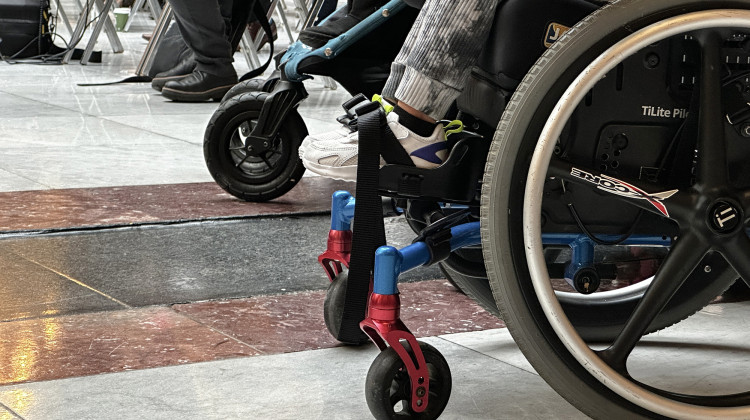
Indiana Disability Rights and ACLU of Indiana filed a federal complaint on behalf of two Indiana children who receive attendant care from their parents as well as the Indiana Protection and Advocacy Services Commission.
Abigail Ruhman / IPB NewsA lawsuit filed against the Family and Social Services Administration challenges the policy change to a program utilized by more than 1,600 children with disabilities.
Families of medically complex children have raised concerns for months that an upcoming change to a Medicaid program would impact their ability to care for their children.
FSSA said family caregivers will no longer be able to provide attendant care — instead shifting to the Structured Family Caregiving program on July 1. Indiana Disability Rights and ACLU of Indiana filed a federal complaint on behalf of two Indiana children who receive attendant care from their parents and the Indiana Protection and Advocacy Services Commission.
The lawsuit asks the court to temporarily halt the scheduled policy change — as well as direct FSSA to ensure the state provides resources for medically complex individuals to remain in their community.
It alleges FSSA’s actions violate the Rehabilitation Act and the integration mandate of the Americans with Disabilities Act, as well as a number of Medicaid rules. It also said the policy change will deny medically complex children access to “the critical in-home care they need, putting them at risk for institutionalization.”
According to the lawsuit, FSSA’s decision to allow legally responsible individuals, such as parents of minors or spouses of adult recipients, to provide attendant care shows the agency “has failed and continues to fail in its duty” to ensure people receive services to meet medically complex needs.
For medically complex individuals, their medical needs can require the presence of a caregiver who is trained to provide specific types of care and supervision. However, the lawsuit claims it is “virtually impossible that any home health agency would assign a non-LRI attendant to care for such an individual.”
Tom Crishon, legal director at Indiana Disability Rights, said in a statement the lawsuit is intended to allow children to continue receiving care in their homes and communities.
“This policy not only ignores the critical needs of these medically complex children, but it also disrespects the incredible dedication of their parents who have become experts in caring for their unique situations,” Crishon said.
Join the conversation and sign up for the Indiana Two-Way. Text "Indiana" to 765-275-1120. Your comments and questions in response to our weekly text help us find the answers you need on statewide issues.
In a response to recommendations from families of medically complex children, FSSA said attendant care is still allowed if care is provided by an attendant that is not a legally responsible individual. But the agency said the transition to the Structured Family Caregiving program allows legally responsible individuals, or LRIs, to provide services in a “fiscally responsible way” that is in compliance with the state’s approved waivers.
The lawsuit said Structured Family Caregiving is not an adequate replacement for LRI-provided attendant care and FSSA has not taken the steps to ensure medically complex individuals will have access to necessary services.
While Indiana’s waiver does not allow LRIs to provide attendant care, it is something that the Centers for Medicare and Medicaid Services allows. The lawsuit said that despite FSSA’s “longstanding awareness” that LRIs are allowed to provide these services, the agency has not attempted to amend the state’s waiver. It said the agency has the authority to do so “at all times.”
Melissa Keyes, executive director at Indiana Disability Rights, said in a statement children with medically complex conditions need access to appropriate care and supervision.
“Parents and families have for years been able to cobble together a patchwork of services and caregivers, including serving as paid caregivers themselves, to ensure their children have what they need to live safely in the community,” Keyes said. “Now, FSSA is throwing a wrench in those plans without ensuring there are appropriate alternatives available.”
The plaintiffs said they and hundreds of other “similarly situated Hoosiers” need relief.
Abigail is our health reporter. Contact them at aruhman@wboi.org.
9(MDAyMzk1MzA4MDE2MjY3OTY1MjM5ZDJjYQ000))
 DONATE
DONATE








 View More Programs
View More Programs

 Support WFYI. We can't do it without you.
Support WFYI. We can't do it without you.